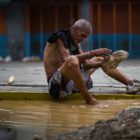Culture
Venezuela: Life Is Chaos
|
The government of Venezuelan President Nicolas Maduro remains entrenched in Caracas despite more than 6 years of U.S. sanctions. Mr. Maduro sells off the nation’s vast oil and gold resources to reward loyalists, exploits the splintered opposition, and benefits from economic and diplomatic support from Russia, China, Iran, and other countries.
Meantime, Venezuela’s 30 million people are suffering through the worst economic crisis in a century. An estimated 5 million have fled the country. Those who remain face shortages of food, fuel, clean water and a viable healthcare system in the era of coronavirus. Incomes have been obliterated by mismanagement, corruption and hyperinflation.












